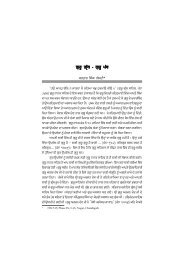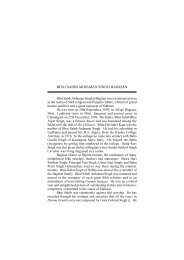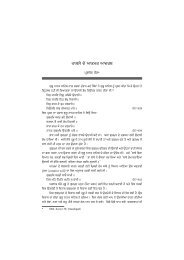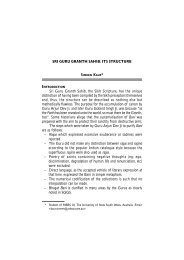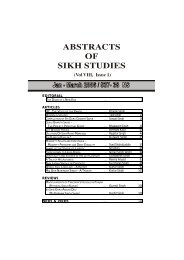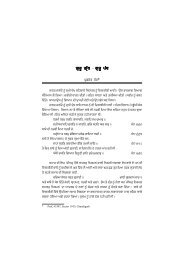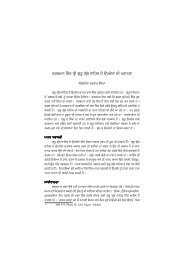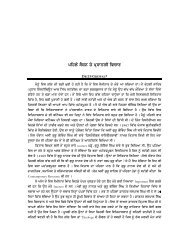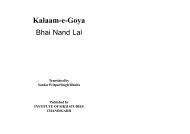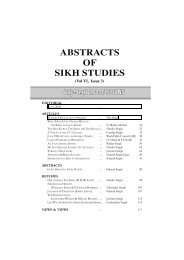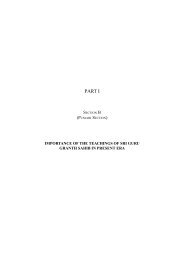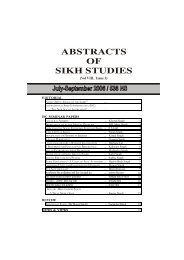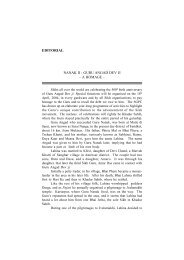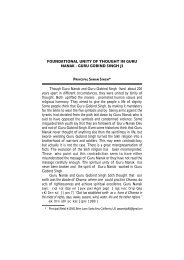editorial articles reviews news & views - Institute of Sikh Studies
editorial articles reviews news & views - Institute of Sikh Studies
editorial articles reviews news & views - Institute of Sikh Studies
You also want an ePaper? Increase the reach of your titles
YUMPU automatically turns print PDFs into web optimized ePapers that Google loves.
THE CAT IS OUT OF THE BAG<br />
95<br />
says that in fact bana means only hair covered with turban and not the<br />
5 ks. Some <strong>of</strong> the statements or judgments made by the learned editor<br />
are also worth noting. He says that “to such a person that in fact is the<br />
only definition <strong>of</strong> a <strong>Sikh</strong>” What is the definition <strong>of</strong> a <strong>Sikh</strong> He is silent<br />
about it. And the word “only” prompts me to ask; are there more than<br />
one definitions <strong>of</strong> a <strong>Sikh</strong> He has avoided finding an answer to these<br />
questions, as a logical answer will for sure contradict his thesis. The<br />
learned editor further avers that bana gives license to religious and<br />
political leaders <strong>of</strong> <strong>Sikh</strong>s to be corrupt. No doubt majority <strong>of</strong> <strong>Sikh</strong><br />
leaders (and scholars as well, why to pick leaders only) are corrupt,<br />
but to say that bana (which according to him means 5 ks) gives them a<br />
license to be corrupt, is stooping even below the level <strong>of</strong> yellow<br />
journalism. There are heaps <strong>of</strong> corrupt people who call themselves<br />
<strong>Sikh</strong>s but do not adorn 5 ks. There are heaps <strong>of</strong> non-<strong>Sikh</strong> political and<br />
religious leaders who are corrupt form head to toe. Who or what<br />
gives them the license Or would he classify them as unlicensed corrupt<br />
people Every corrupt person tries to conceal himself. But that does<br />
not mean that cover he hides under is a cause <strong>of</strong> his/her corruption.<br />
It is even more disappointing when this thesis comes from the editor<br />
<strong>of</strong> a journal discussing serious philosophical issues. In fact the 5 ks<br />
gives the world a license and a right to question a person who adorns<br />
them as to why he does not follow the tenets <strong>of</strong> <strong>Sikh</strong>ism. This right<br />
has been exercised in the pages <strong>of</strong> <strong>Sikh</strong> Bulletin on hundreds <strong>of</strong> times.<br />
Using this license, many people have criticized Mr Badal for performing<br />
rituals like havan.<br />
The learned editor now turns his microscope on to the words<br />
patit or apostate. Once again his logic is weird. He finds that an<br />
apostate means a person who has forsaken his religion. However, he<br />
is upset that for <strong>Sikh</strong>s a person is apostate if he cuts his hair. Obviously,<br />
in his opinion, for <strong>Sikh</strong>s, cutting <strong>of</strong> hair should not amount to forsaking<br />
<strong>of</strong> religion. He does not bother to justify his stand with any logic, and<br />
closes the thread by saying that character has been reduced to<br />
insignificance. In what way are keeping <strong>of</strong> hair and character related<br />
Are they mutually exclusive or inclusive Or are these two separate<br />
things altogether He conveniently shifts his focus in order to avoid<br />
finding an answer to these questions. This technique is <strong>of</strong>ten used by<br />
many kathakars in our gurdwaras. Instead <strong>of</strong> discussing a subject in



